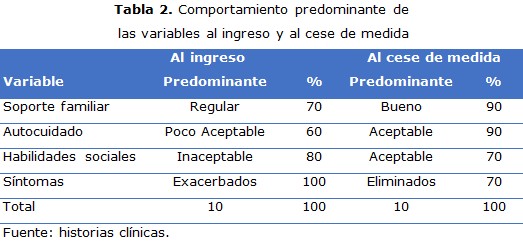Social reintegration in the Forensic Psychiatry unit in Sancti Spíritus
Keywords:
DeCs., Unidad de Psiquiatría Forense, asegurado, rehabilitaciónAbstract
Background: Forensic Psychiatry is the application of psychiatric knowledge to the justice administration process.
Objective: to describe the behavior of social reintegration in the Forensic Psychiatry Unit of Sancti Spiritus.
Methods: the results of the study of the behavior of the insured in the Forensic Psychiatry Unit of Sancti Spiritus 2016 to 2018 are communicated.
Results: it predominates the age group between 24 to 35 years, male sex, paranoid schizophrenia with atypical neuroleptics as modality of most commonly used psycho-pharmacological treatment. Positive changes were achieved, which helped the request to cease the measure with its subsequent social reintegration.
Conclusions: with the integral application of therapies, changes are achieved that allow social reintegration, reducing the risk that they may commit crimes or be violent in the future.
DeCS: FORENSIC PSYCHIATRY; SOCIAL ADJUSTMENT; SCHIZOPHRENIA, PARANOID/therapy; SCHIZOPHRENIA, PARANOID/rehabilitation; ANTIPSYCHOTIC AGENTS/therapeutic use.
Downloads
References
1. Castro BD, Dickerman de Castro A. Psicogénesis Delictiva Psiquiatría Forense Medicina Legal [Internet]. Tegusigalpa: Academia;1994 [citado 21 Nov 2019]. Disponible en: http://www.bvs.hn/Honduras/medicina.legal.psiquiatria.forense/pdf/medicina.legal.psiquiatria.forense.pdf
2. Rodríguez Jorge RR, Loy Vera B. Bases teóricas de las ciencias forenses contemporáneas y las competencias interdisciplinarias profesionales. Medicentro Electrón [Internet]. Mar 2016 [citado 21 Nov 2019];20(1): [aprox. 7 p.]. Disponible en: http://scielo.sld.cu/scielo.php?script=sci_arttext&pid=S1029-30432016000100002&lng=es
3. Lancís F. Historia de la Psiquiatría Forense en Cuba: Un intento de síntesis [Internet]. La Habana: Universidad de Ciencias Médicas; 1983. [citado 21 Nov 2019]. Disponible en: http://files.sld.cu/psiquiatria/files/2018/09/S%C3%ADntesis-de-la-historia-de-la-Psiquiatr%C3%ADa-en-Cuba.pdf
4. Vidal Palmer LE, Rubalcaba Fernández C, Borges Gonzáles S. Papel del Hospital Psiquiátrico de La Habana en el desarrollo de la psiquiatría forense en Cuba, su rehabilitación. Rev Hosp Psiquiát Habana [Internet]. 2006 [citado 21 Nov 2019];3(2):[aprox. 3 p.]. Disponible en: http://www.revistahph.sld.cu/hph0206/hph02706.htm
5. González J, Basanta AM. El Instituto de Medicina Legal de La Habana (Cuba). Cuad med forense [Internet]. Jun 2010 [citado 21 Nov 2019];16(1-2):[aprox. 9 p.]. Disponible en: http://scielo.isciii.es/scielo.php?script=sci_arttext&pid=S1135-76062010000100006&lng=es
6. Vidal Palmer LE. Peligrosidad y medidas de seguridad. Psicología com [Internet]. 2006 [citado 21 Nov 2019];10(1):[aprox. 5 p.]. Disponible: https://psiquiatria.com/psiquiatria_legal/peligrosidad-y-medidas-de-seguridad/.
7. Sadock B, Sadock V, Sadock K. Sinopsis de Psiquiatría. 11a ed. [Internet]. Barcelona: Wolters Kluwer;2015 [citado 21 Nov 2019]. Disponible en: http://www.icebe.es/libro/kaplan-sadock-sinopsis-de-psiquiatria-11-edicion_3131
8. American Psychiatric Association. Manual diagnóstico y estadístico de trastornos mentales [Internet]. Madrid: Editorial Médica Panamericana;2014 [citado 21 Nov 2019]. Disponible en: https://dsm.psychiatryonline.org/pbassets/dsm/update/Spanish_DSM5Update2016.pdf
9. Corrivetti G, Caserta D, Perna C. Implementation of cognitive rehabilitation in psychiatric services: integration of cognitive remediation and psychosocial rehabilitation. J Psychopathol [Internet]. 2018 [citado 21 Nov 2019];24:[aprox. 4 p.]. Disponible en: https://www.researchgate.net/publication/326467052_Implementation_of_cognitive_rehabilitation_in_psychiatric_services_Integration_of_cognitive_remediation_and_psychosocial_rehabilitation/citation/download
10. Bechi M, Bosia M, Spangaro M, Buonocore M, Cocchi F, Pigoni A, et al. Combined social cognitive and neurocognitive rehabilitation strategies in schizophrenia: neuropsychological and psychopathological influences on Theory of Mind improvement. Psychol Med [Internet]. 2015 [citado 21 Nov 2019];45(15):[aprox. 9 p.]. Disponible en: https://www.ncbi.nlm.nih.gov/pubmed/26062741
11. Armas Caicedo R. Estrategias de rehabilitación cognitiva en el tratamiento de la esquizofrenia para fomentar la autonomía. Diseño de caso único [Tesis Maestría]. España: Universitat Jaume I. Departamento de Psicologia B? sica;2015 [citado 21 Nov 2019]. Disponible en: http://repositori.uji.es/xmlui/bitstream/handle/10234/142028/TFM_2015_ArmasCaicedoR.pdf?sequence=1&isAllowed=y
12. Sutu A, Moro M, Mezquita L. Programa de rehabilitación neurocognitiva para pacientes con trastorno mental grave. Un estudio piloto. Ágora de Salut [Internet]. 2015 [citado 21 Nov 2019];1(27): [aprox. 9 p.]. Disponible en: http://dx.doi.org/10.6035/AgoraSalut.2015.1.27

Published
How to Cite
Issue
Section
License
Copyright (c) 2020 Juan Carlos Mirabal-Requena, Belkis Alvarez-Escobar

This work is licensed under a Creative Commons Attribution-NonCommercial 4.0 International License.
Copyright: Camagüey Medical Archive Magazine, offers immediately after being indexed in the SciELO Project; Open access to the full text of the articles under the principle of making available and free the research to promote the exchange of global knowledge and contribute to a greater extension, publication, evaluation and extensive use of the articles that can be used without purpose As long as reference is made to the primary source.
Conflicts of interest: authors must declare in a mandatory manner the presence or not of conflicts of interest in relation to the investigation presented.
(Download Statement of potential conflicts of interest)
The Revista Archivo Médico de Camagüey is under a License Creative Commons Attribution-Noncommercial-No Derivative Works 4.0 International (CC BY 4.0).
This license allows others to distribute, to mix, to adjust and to build from its work, even for commercial purposes, as long as it is recognized the authorship of the original creation. This is the most helpful license offered. Recommended for maximum dissemination and use of licensed materials. The full license can be found at: https://creativecommons.org/licenses/












 22 julio 2025
22 julio 2025